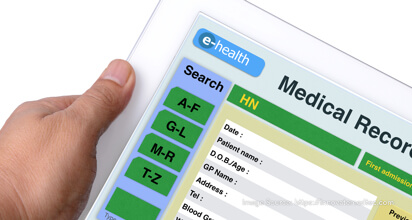Barriers to the acceptance of EMR by Physicians
Electronic medical records software can improve healthcare delivery. But not all physicians have bought into the benefits of EMR software. Learn about why some physicians are still holding out.
Custom electronic medical records software provides many benefits such as improved quality and coordination of patient care, as well as efficiencies in healthcare delivery. However, electronic medical record systems adoption remains short of its potential. In many instances, adoption has been incomplete, focused on core tasks rather than on comprehensive management. And adoption has been uneven. Custom electronic medical records software is common at large hospitals and clinics but is not always utilized at medium and small medical practices.
EMR software requires physicians to embrace new practices. Before a healthcare organization can adopt an EMR solution, it must first gain physician acceptance. Yet some physicians resist adopting custom EMR solutions. Let’s look at some of their chief concerns.
Hesitation about up-front costs
If a clinical practice does not already use custom EMR software solutions, the initial expenditure can seem like a significant new cost that hasn’t been previously budgeted. These costs involve both monetary outlays and staff salary expenses.
The most significant up-front cost is buying and installing an electronic medical record system. For custom EMR applications, time must be allocated to determine special requirements, and to implement customization. Users of custom electronic medical records software need training before they can use it productively. This training can take several days to complete. Often, users find that rudimentary training is not sufficient to use the EMR effectively, and they will want additional training.
Another up-front cost occurs when clinics need to change the configuration of their offices to accommodate special IT equipment used for the EMR software.
Concerns about productivity
Some electronic medical record systems force physicians to tailor their workflow around the needs of the system, instead of letting the system support the physician’s preferred workflow. Some older EMR systems focused more on administrative record keeping rather than patient care. Such systems didn’t directly benefit the physician, even if they benefited the healthcare organization overall.
Another worry is that EMR is too complex and difficult to use. The time required to learn and use custom EMR applications can seem like time taken away from patient care. When electronic medical record systems are overly complex, physicians are inclined to ask: Does EMR software really make physicians more productive?
Another common concern is that electronic medical record systems will interfere with the physician’s communication with patients. For example, if the system requires the physician to be facing a computer monitor and using a keyboard to enter data, the physician won’t be maintaining eye contact with the patient.
Why do some physicians resist adopting electronic medical records software? Find out some key concerns of doctors who haven’t yet joined the ranks of EMR software users.
Questions about reliability
Physicians may worry about the integrity of patient clinical information stored in an EMR system. They need assurance this information is readily available and will be used properly.
Compared to paper records stored in a file folder, electronic medical records software sparks unique issues about how patient data is shared. One issue involves data interoperability. Data about a patient may be stored on different systems, which can’t communicate with each other because they use different standards.
Another concern some physicians have relates to privacy. They may be concerned that data about patients in an EMR could be inappropriately accessed by outside parties.
A different concern relates to the reliability of patient data. In a poorly designed EMR application, data could be incomplete, because required information wasn’t captured when it should have been. Doctors may also worry data will be unavailable when they need to access it because of software glitches, network problems, or other technical issues.
Long-term uncertainties
Like any major IT system, custom EMR software solutions require updating over time.
Physicians may be concerned about the amount of maintenance that’s required over the long term. They may wonder about the potential for the system they buy to become obsolete. They may think about the risks that their vendor won’t provide ongoing support, and the possibility the vendor will go out of business in the future.
All these concerns point to a common theme: Vendors of EMR systems need to demonstrate they are a reliable, long-term partner if they want to earn physicians’ trust.
We as a team of 150+ tech geeks, understand all the pain-points that healthcare providers face while choosing to implement electronic medical record software in practice. Vinfotech is efficient to provide custom electronic medical record system as per the individual’s requirement. Get in touch to know more about our healthcare software solutions.
- While adoption of EMR software has been impressive, some physicians resist using EMR solutions
- Before an organization can implement EMR solutions, they must win the acceptance of staff physicians
- Physicians can be concerned that EMR software applications are too expensive
- Physicians may be worried that EMR solutions will interfere with their patient care
- Custom EMR applications need to inspire confidence that they will meet the current and future needs of physicians using them
About Vinfotech
Whether you are looking out to build a chatbot on top of your telehealth app as a smart symptom tracker, or take charge of improving overall healthcare experience of your hospital by connecting your staff, doctors and patients over a gamified online community integrated with various fitness wearables and medical devices, turn to Vinfotech.
Vinfotech is design-led healthcare ecosystem software provider for governments, healthcare organizations, care providers, medical ISVs, device manufacturers and software product companies with following expertise:
/ Healthcare online communities (for patients, hospitals & donors)
/ Telehealth
/ E-prescription
/ EMR
/ Coordinated care solutions
/ Chatbot, medical device and wearable integration
/ Any custom web/ mobile app















